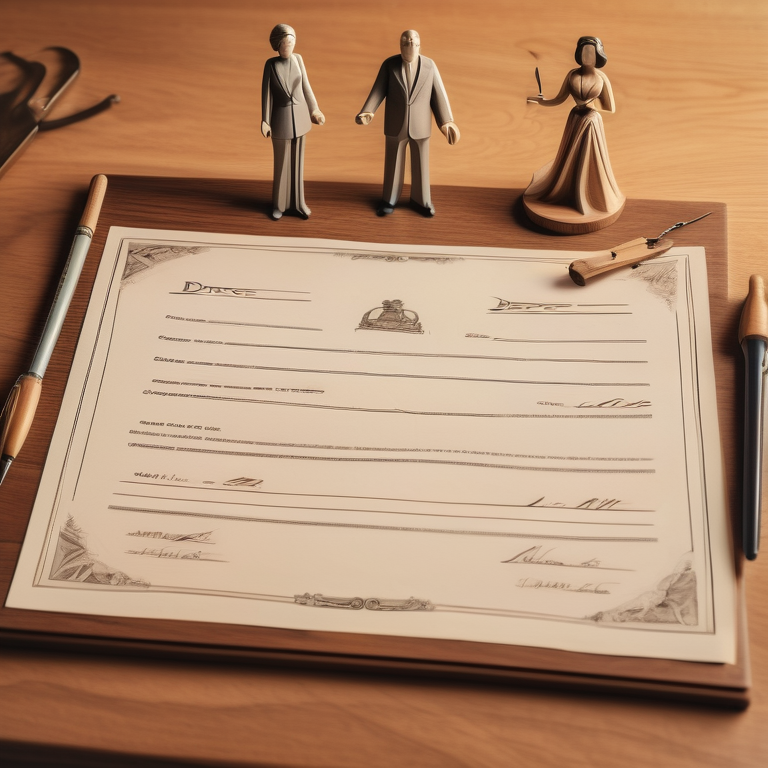Navigating the divorce process can be overwhelming, but with DIY divorce forms in Ireland, you have the flexibility to handle things on your own terms. To ensure a successful outcome, here are some tips and tricks to keep in mind:
1. Research Thoroughly: Begin by researching the specific divorce forms required in Ireland and familiarise yourself with the process.
2. Follow Guidelines Carefully: Pay close attention to instructions provided with the DIY forms to avoid mistakes that could prolong the process.
3. Complete Forms Accurately: Fill out the forms accurately and provide all necessary information to prevent delays or complications.
4. Consult a Solicitor in Ireland if Needed: Don’t hesitate to consult a solicitor in Ireland if you encounter any complex legal issues or uncertainties during the DIY process.
5. Review Before Submission: Before submitting the completed forms, review them carefully to ensure accuracy and completeness.
6. Stay Organised: Keep all documents related to the divorce process in a secure and organised manner for easy reference in the future.
Key Highlights
- DIY divorce in Ireland allows couples to navigate the divorce process without the for a solicitor, DIY divorce may provide a more accessible solution for couples in Ireland.
- Understanding the legal framework and requirements is crucial for a successful DIY divorce in Ireland.
- Essential documents and forms needed for DIY divorce include the application form, marriage certificate, affidavit of welfare, and affidavit of means.
- Avoiding common mistakes and ensuring accuracy and completeness are key to a smooth divorce process.
- Utilising online resources such as DIY Divorce Solutions can provide support and guidance throughout the DIY divorce journey.
- It is important to be aware of the known and unknown factors in the DIY divorce process in Ireland to make informed decisions.
Introduction
Divorce can be a challenging and emotional process, but in Ireland, couples have the option of a DIY divorce, which allows them to navigate the process without the need for a solicitor. DIY divorce offers a more affordable and efficient alternative to traditional divorce proceedings. However, it is important to understand the legal framework and requirements involved in DIY divorce in Ireland, including the benefits of using a reputable divorce services provider, to ensure a successful outcome.
In this blog, we will provide a comprehensive guide to DIY divorce forms in Ireland, offering tips and tricks for a successful DIY divorce. We will cover essential documents and forms needed, common mistakes to avoid, and tips for accuracy and completeness. Additionally, we will explore online resources that can provide support and guidance throughout the DIY divorce process.
Whether you are considering a DIY divorce or simply want to understand the process better, this blog will provide valuable insights and information to help you navigate the DIY divorce journey with confidence.
Understanding DIY Divorce in Ireland
Before diving into the specifics of DIY divorce forms in Ireland, it is important to have a clear understanding of what DIY divorce really means. DIY divorce, also known as self-representation or self-help divorce, allows couples to navigate the divorce process without the need for a solicitor. It is a legal process governed by the Family Law Act and the circuit court rules. Understanding the legal framework and requirements is crucial for a successful DIY divorce in Ireland. www.diydivorcesolutions.ie
What DIY Divorce Really Means
DIY divorce means that couples can handle the divorce process themselves without the need for legal advice or representation from a solicitor. It is important to note that DIY divorce does not mean divorcing without legal implications. Divorce is a legal process governed by family law in Ireland. While DIY divorce allows couples to navigate the process on their own, it is essential to have a good understanding of family law and the legal requirements involved in divorce proceedings. This includes knowing the necessary documents, forms, and steps involved in the process to ensure a successful outcome. www.diydivorcesolutions.ie
The Legal Framework Surrounding Divorce in Ireland
The legal framework surrounding divorce in Ireland is governed by the Family Law Act and the circuit court rules. The Family Law Act provides the basis for divorce proceedings in Ireland, outlining the requirements and procedures involved. The circuit court is the court responsible for handling divorce cases in the Republic of Ireland. Understanding the legal framework is crucial for couples considering a DIY divorce, as it sets the foundation for the process. It is also important to be aware of other legal options such as applying for a decree of judicial separation, which is a legal document confirming that a couple is no longer obliged to live together as a married couple.
Preparing for DIY Divorce
Before diving into the DIY divorce process, it is important to prepare the necessary documents and forms. Essential documents for DIY divorce in Ireland include the application form, original marriage certificate, affidavit of welfare, and affidavit of means. The application form provides important details about the marriage, living arrangements, and children of the marriage. The original marriage certificate is a legal document that verifies the marriage and must be filed with the court office. The affidavit of welfare outlines the personal details and welfare of the dependent children, while the affidavit of means provides information about the financial position of both parties. Having these documents in order is crucial for a smooth DIY divorce process.
Essential Documents and Forms Needed
When proceeding with a DIY divorce in Ireland, there are several essential documents and forms that you will need to prepare. These documents, including details of the documents required, are crucial for the divorce process and provide important information to the court. Here are the essential documents and forms needed for a DIY divorce in Ireland:
- Application Form (Family Law Civil Bill): This form provides details about the marriage, living arrangements, and children. It is the main document that initiates the divorce process.
- Marriage Certificate: This document verifies the marriage and is required to prove the legal status of the marriage.
- Affidavit of Welfare (Form 37B): This form outlines the personal details and welfare of the children, including their living arrangements, education, and maintenance arrangements.
- Affidavit of Means (Form 37A): This form provides information about the financial position of both parties, including assets, income, debts, and liabilities.
These documents and forms must be completed accurately and in accordance with the court’s requirements to ensure a smooth DIY divorce process. It is recommended to consult a solicitor in Ireland or consult online resources for guidance on completing these documents correctly. www.diydivorcesolutions.ie
Step-by-Step Guide to Filling Out Divorce Forms
Filling out divorce forms is an essential part of the DIY divorce process in Ireland. Understanding the step-by-step guide to filling out these forms is crucial for a successful DIY divorce. Key divorce forms include the application form and the civil bill, which must be submitted with the relevant Circuit Court. These forms require accurate and detailed information about the marriage, living arrangements, and children. The indorsement of claim is where the applicant sets out the details of the marriage as he or she knows them, providing evidence and support for their claim. It is important to note that this document must be sworn in the presence of a commissioner for oaths or a practising solicitor. Most solicitors firms offer this service in a affordable document witnessing. Following a step-by-step guide will ensure that you complete the forms correctly and provide all the necessary information for the court to process your DIY divorce application. www.diydivorcesolutions.ie
Common Mistakes to Avoid
When filling out divorce forms for a DIY divorce in Ireland, it is important to be aware of common mistakes that can occur. By avoiding these mistakes, you can ensure a smoother and more successful DIY divorce process. Here are some common mistakes to avoid:
- Not providing accurate and complete information on the forms.
- Failing to reach a full agreement on important issues such as child custody, maintenance payments, and property division.
- Not making proper provision for the welfare of children and dependent family members.
- Neglecting to include all necessary documents and forms.
- Failing to meet the court’s requirements and deadlines.
By being aware of these common mistakes and taking the necessary precautions, you can navigate the DIY divorce process with minimal setbacks and achieve a successful outcome. www.diydivorcesolutions.ie
Tips for Ensuring Accuracy and Completeness
Ensuring accuracy and completeness when filling out divorce forms is crucial for a successful DIY divorce in Ireland. Here are some tips to help you maintain accuracy and completeness throughout the process:
- Double-check all information before submitting the forms to ensure accuracy.
- Include all necessary details and supporting documentation to ensure completeness.
- consult a solicitor in Ireland or consult online resources for guidance on completing the forms correctly.
- Consider using a statutory declaration to verify the accuracy of the information provided.
- Take your time when filling out the forms to avoid errors or omissions.
- Review the completed forms before submitting them to the court.
By following these tips and taking the necessary steps to ensure accuracy and completeness, you can navigate the DIY divorce process in Ireland with confidence and increase the likelihood of a successful outcome.
Navigating the Divorce Process
Navigating the divorce process can be complex, but with the right knowledge and resources, you can navigate it successfully. Understanding the steps involved, from submission to finalisation, is crucial for a smooth DIY divorce process in Ireland. By following a step-by-step guide and being prepared for potential delays and challenges, you can navigate the divorce process with confidence and achieve a successful outcome. www.diydivorcesolutions.ie
From Submission to Finalisation
Once the divorce forms have been completed and submitted, the DIY divorce process in Ireland progresses from submission to finalisation. After submission, the court will review the forms and schedule a court hearing. During the hearing, the court will consider the details of the divorce and, if satisfied, grant a court order known as a decree of divorce, finalising the divorce. This court order formally ends the marriage and allows both parties to remarry. It is important to be prepared for the court hearing and provide any additional information or documents as required, such as a pension adjustment order if necessary. Navigating the process from submission to finalisation, including submitting a Notice of Motion and Affidavit, requires attention to detail and adherence to the court’s requirements.
Dealing with Delays and Challenges
The DIY divorce process in Ireland can sometimes experience delays and challenges that may impact the timeline of the divorce. It is important to be prepared for potential delays and have a contingency plan in place. Here are some tips for dealing with delays and challenges, including the difficult process of modifying court orders in the context of divorce, during the contentious process of a DIY divorce:
- Stay organised and keep track of all documents, deadlines, and court dates.
- Communicate effectively with the court and any involved parties to ensure smooth progress.
- Be prepared for potential challenges or disputes and consider seeking legal advice if necessary.
- Have a contingency plan in place in case of unexpected delays or complications.
By being proactive and prepared, you can navigate the DIY divorce process in Ireland more effectively and overcome any delays or challenges that may arise.
Utilising Online Resources
In the digital age, online resources can be invaluable tools for individuals navigating the DIY divorce process in Ireland. Online resources provide guidance, support, and access to essential information and services. From DIY divorce solutions to legal aid resources, utilising online resources can enhance your understanding of the process and provide assistance throughout the journey. In the next sections, we will explore specific online resources that can be particularly helpful during the DIY divorce process in Ireland.
Why www.diydivorcesolutions.ie is Your Go-To Resource
One of the go-to online resources for individuals seeking guidance and support during the DIY divorce process in Ireland is www.diydivorcesolutions.ie. This comprehensive website offers a range of support services tailored to individuals navigating their own divorce. From step-by-step guides to downloadable forms, www.diydivorcesolutions.ie provides valuable resources to ensure accuracy, completeness, and success throughout the DIY divorce process. Whether you are seeking information on filling out divorce forms or guidance on navigating the court system, www.diydivorcesolutions.ie is a trusted resource for individuals embarking on the DIY divorce journey in Ireland. www.diydivorcesolutions.ie
Other Helpful Online Tools and Resources
In addition to www.diydivorcesolutions.ie, there are other helpful online tools and resources available to individuals navigating the DIY divorce process in Ireland. These resources provide valuable information, guidance, and support throughout the divorce journey. Here are some examples of other helpful online tools and resources:
- Legal Aid Board: The Legal Aid Board provides information on legal aid services available to individuals who may require financial assistance during the divorce process.
- Citisens Information: The Citisens Information website offers comprehensive information on divorce, separation, and family law in Ireland.
- Family Mediation Service: The Family Mediation Service provides information on mediation as an alternative to going to court and offers a list of accredited mediators.
- Family Law Courts: The Ireland Courts Service website provides information on the court system and procedures for family law matters, including divorce.
By utilising these online tools and resources, individuals can access valuable information and support to navigate the DIY divorce process in Ireland more effectively. www.diydivorcesolutions.ie
Key Takeaways on DIY Divorce Forms in Ireland
Navigating the DIY divorce process in Ireland requires a good understanding of the legal framework, essential documents, and the steps involved. Here are some key takeaways on DIY divorce forms in Ireland:
- DIY divorce allows couples to navigate the process without the need for a solicitor, saving time and money.
- Essential documents for DIY divorce include the application form, marriage certificate, affidavit of welfare, and affidavit of means.
- Avoiding common mistakes and ensuring accuracy and completeness are crucial for a successful DIY divorce.
- Utilising online resources such as DIY Divorce Solutions can provide guidance and support throughout the DIY divorce process.
By keeping these key takeaways in mind, individuals can approach the DIY divorce process in Ireland with confidence and achieve a successful outcome.
Summary of Important Points
In summary, DIY divorce forms in Ireland offer couples the opportunity to navigate the divorce process without the need for a solicitor. Understanding the legal framework, preparing the necessary documents, and avoiding common mistakes are key factors for success when pursuing a DIY divorce. Utilising online resources such as DIY Divorce Solutions can provide valuable guidance and support throughout the process. By following a step-by-step guide, individuals can navigate the divorce process from submission to finalisation, ensuring accuracy and completeness along the way. It is important to be prepared for potential delays and challenges and have a contingency plan in place. By utilising online resources and being proactive, individuals can achieve a successful DIY divorce in Ireland. www.diydivorcesolutions.ie
What is Known and Unknown in the DIY Divorce Process
When embarking on the DIY divorce process in Ireland, it is important to be aware of both the known and unknown aspects of the process. The known aspects include the legal requirements, necessary documents, and steps involved in the divorce application process. These are well-documented and can be navigated with guidance and support. The unknown aspects may include potential challenges and delays that can arise throughout the process. It is important to be prepared for these unknowns and to have a contingency plan in place. By being proactive, seeking guidance, and staying informed, individuals can navigate the DIY divorce process with confidence and achieve a successful outcome.
Conclusion
In conclusion, navigating the DIY divorce process in Ireland can be a challenging task, but with proper preparation and understanding of the legal framework, it is achievable. By ensuring accuracy, completeness, and avoiding common mistakes, you can streamline the process. Utilising online resources like www.diydivorcesolutions.ie can serve as valuable guides. Remember, being well-informed about the DIY divorce forms and the overall process is key to a successful outcome. Stay patient, seek help when needed, and follow the steps diligently to reach a resolution efficiently. www.diydivorcesolutions.ie
Frequently Asked Questions
Can I file for divorce in Ireland without a Solicitor?
Yes, it is possible to file for divorce in Ireland without a solicitor. DIY divorce allows couples to navigate the divorce process without the need for a solicitor. However, it is important to have a good understanding of family law and the legal requirements involved in the divorce application process.
How long does the DIY divorce process take in Ireland?
The duration of the DIY divorce process in Ireland can vary depending on various factors, such as workload and complexity of the case. Generally, the process can take several months from the initial application to the final court hearing. The specific time frame will be subject to the circuit court rules and the availability of a hearing date.
Are there any hidden costs in filing for divorce by myself?
While filing for divorce by yourself can be more cost-effective compared to hiring a solicitor, it is important to consider potential hidden costs. These may include court fees, costs associated with obtaining necessary documents, and any additional expenses related to the divorce proceedings. It is important to assess your financial situation and budget accordingly when filing for divorce.
What if my spouse contests the DIY divorce?
If your spouse contests the DIY divorce, the process may become more contentious and complex. It is advisable to seek legal representation to navigate the contested divorce proceedings. In such cases, a court hearing will be scheduled to resolve any disputes and make necessary decisions regarding the divorce.










